|
|
|
Sort Order |
|
|
|
Items / Page
|
|
|
|
|
|
|
| Srl | Item |
| 1 |
ID:
138595
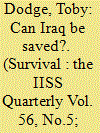

|
|
|
|
|
| Summary/Abstract |
Policymakers, journalists and pundits have struggled to understand the seizure of Mosul by the Islamic State of Iraq and al-Sham (ISIS) on 10 June 2014, the group’s drive south towards Baghdad and the collapse of the Iraqi army in the face of its advance. The way in which this fast-moving crisis is perceived will determine the response of leaders in Iraq, the wider Middle East and across the international system. It will not only shape the initial military response to ISIS but, much more importantly, the formulation of longer-term policies that aim to tackle the underlying causes of the group’s rise and its seizure of territory in both Iraq and Syria.
|
|
|
|
|
|
|
|
|
|
|
|
|
|
|
|
| 2 |
ID:
138603
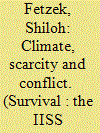

|
|
|
|
|
| Summary/Abstract |
Soon after he took office in 2007, United Nations Secretary-General Ban Ki-moon declared that there was an urgent need to reframe the debate on climate change from an environmental to a development and security issue, and that it would be one of his top priorities as UN leader.
Environmental factors, including land use, water availability, biodiversity loss, soil degradation and acute weather events, have been implicated in at least 73 conflicts since 1980, and at least 40% of intra-state conflicts since the end of the Second World War can be associated with natural resources. A rapidly growing body of research on climate change, resource scarcity and conflict has ensured that the issue is rising on the international agenda. Yet, although such concerns cut across the security, development and humanitarian sectors, there is little dialogue, let alone coordination, between and among government departments and international and non-governmental organisations responsible for these domains.
|
|
|
|
|
|
|
|
|
|
|
|
|
|
|
|
| 3 |
ID:
138601
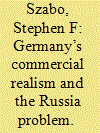

|
|
|
|
|
| Summary/Abstract |
Russia’s annexation of Crimea and its attempts to destabilise Ukraine resemble traditional geopolitics and have prompted references to a ‘new Cold War’, but this comparison overlooks the transformation in the nature of international affairs brought about by globalisation, and its implications for Berlin’s relationship with other Western capitals, as well as Moscow. We are in an era of commercial realism, and Germany is the kind of prototypical geoeconomic power that challenges the old type of military-based power embodied by the United States and Russia. Moscow’s use of, and threat to use, military force in Ukraine are only part of the opening phase in a much longer game, one in which economic interdependence will be decisive.
|
|
|
|
|
|
|
|
|
|
|
|
|
|
|
|
| 4 |
ID:
138602
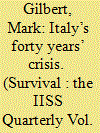

|
|
|
|
|
| Summary/Abstract |
The era of Silvio Berlusconi is over. Italy will never again be represented on the world stage by an ageing businessman with a turbulent private life, a criminal record and pariah status among other European leaders. Power has passed into the hands of a kinetic young man with a pudding-bowl haircut, Matteo Renzi, whose self-proclaimed mission is to rottamare (junk) the old guard in Italian politics and to revive the country’s institutions and economy.
|
|
|
|
|
|
|
|
|
|
|
|
|
|
|
|
| 5 |
ID:
138599
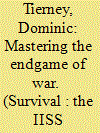

|
|
|
|
|
| Summary/Abstract |
In 1941 Japan weighed the merits of attacking the most powerful country in the world: the United States. It was a war of choice, and Tokyo had time to carefully consider the decision. Japanese leaders debated the best date to strike Pearl Harbor. And they also thought through the potential short-term effects. But Tokyo barely considered the military endgame: the final stages of a campaign in which an armistice is negotiated, hostilities cease and a new post-war order emerges.
|
|
|
|
|
|
|
|
|
|
|
|
|
|
|
|
| 6 |
ID:
138606
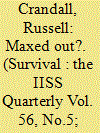

|
|
|
|
|
| Summary/Abstract |
Looking back on how decisively the Cold War ended in America’s favour, it is easy to forget how much doubt there was at the start, among Americans and Soviets alike, that the United States was up to the task of defending its vision of the post-war world order. George Kennan, the storied American diplomat responsible for the 1946 ‘Long Telegram’ from Moscow, recalled
in his memoirs that the Soviets ‘thought it probable that ... Americans, in particular, would not be able to muster, as a nation, the leadership, the imagination, the political skill, the material resources, and above all the national self-discipline necessary’ to prevail in the emerging global contest.
|
|
|
|
|
|
|
|
|
|
|
|
|
|
|
|
| 7 |
ID:
138600


|
|
|
|
|
| Summary/Abstract |
In what has become a tradition for new Chinese presidents seeking to confirm their peaceful intentions, Xi Jinping has put forward yet another ostensibly original security concept. Describing the approach as ‘common, comprehensive, cooperative and sustainable’, Xi has called on countries other than China to align their diverse security interests within a common
project; avoid monopolising security affairs; work towards security without exclusive alliances; and tackle the full range of traditional and nontraditional threats. In line with the new security concept of former President Jiang Zemin, and the idea of peaceful development espoused by his successor Hu Jintao, Beijing now cultivates the image of China as a status quo power that is restrained in its use of military force, willing to accept international norms and prepared to actively participate in international organisations. It also supports the notion of China as a constructive power that is inclined to cooperate and strike a compromise.
|
|
|
|
|
|
|
|
|
|
|
|
|
|
|
|
| 8 |
ID:
138597
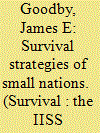

|
|
|
|
|
| Summary/Abstract |
Not all small nations take quite such an extreme a view of their place in the world, but most of them have had historical experiences that justify this kind of existential fear. After all, the vulnerabilities of small nations have been demonstrated countless times throughout history. Thucydides famously recorded the fate of the island of Melos in his history of the Peloponnesian War between Athens and Sparta in the fifth century BCE. A passage in this history, usually called the ‘Melian Dialogue’, describes how the leaders of Athens decided that Melos, which was aligned with Sparta, should be absorbed into their empire. Accordingly, they demanded that
Melos capitulate, under threat of all-out war.
|
|
|
|
|
|
|
|
|
|
|
|
|
|
|
|
| 9 |
ID:
138598
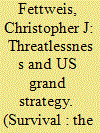

|
|
|
|
|
| Summary/Abstract |
As the Soviet Union was in the process of collapsing, Georgi Arbatov sent a letter to the New York Times that contained a warning for the United States. Arbatov, who was one of the Kremlin’s leading ‘Amerikanists’, wrote that the Soviets were unleashing a ‘secret weapon’, one ‘that will work almost regardless of the American response’. It was not the stuff of Cold War
nightmares, some sort of last-minute deus ex machina from the Academy of Sciences that would rescue the Soviet Union from oblivion. No, in this instance, the weapon was psychological and unequivocal: the Kremlin was about to deprive America of the Enemy.
|
|
|
|
|
|
|
|
|
|
|
|
|
|
|
|
| 10 |
ID:
138596


|
|
|
|
|
| Summary/Abstract |
On 30 July 2014, the European Union published its ‘third-stage’ sanctions on Russia in response to Russian policy towards Ukraine.1 These measures, which came into effect the following day, target whole sectors of the economy rather than individuals and companies, as in the previous two stages. Specifically, they take aim at oil exploration, military assistance, sensitive advanced technology and state-owned banks.
|
|
|
|
|
|
|
|
|
|
|
|
|
|
|
|
| 11 |
ID:
138604
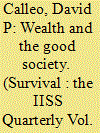

|
|
|
|
|
| Summary/Abstract |
Thomas Piketty’s Capital in the Twenty-First Century has attracted a great deal of attention, and deservedly so. It is a seductive book that soars above the myopia of ordinary economic analysis. It summons rich visions of the past and future and explores their myriad linkages. The result is a complex chain of arguments, inevitably with disruptive disconnections.
In the end, perhaps the author suggests more redistribution than his proposals
would deliver.
|
|
|
|
|
|
|
|
|
|
|
|
|
|
|
|
| 12 |
ID:
138605


|
|
|
|
|
| Summary/Abstract |
This volume is a warning to Pope Francis: an engaging, ironic report of 300 pages or so, whose implicit message is that a change of pontiff alone is not enough to change the Vatican. From this perspective, The Vatican Diaries by John Thavis, a respected reporter and Rome bureau chief for the Catholic News Service of 30 years’ standing, packs a metaphorical punch. The diaries describe an enduring self-referential mentality – a conviction that nothing can actually change inside the Vatican walls and in the Catholic Church, and that in this universe of secrecy and mystery the truth is something to be manipulated and from time to time even fabricated for a ‘superior interest’, no matter what the faithful believe or what the media write and broadcast.
|
|
|
|
|
|
|
|
|
|
|
|
|
|
|
|
|
|
|
|
|